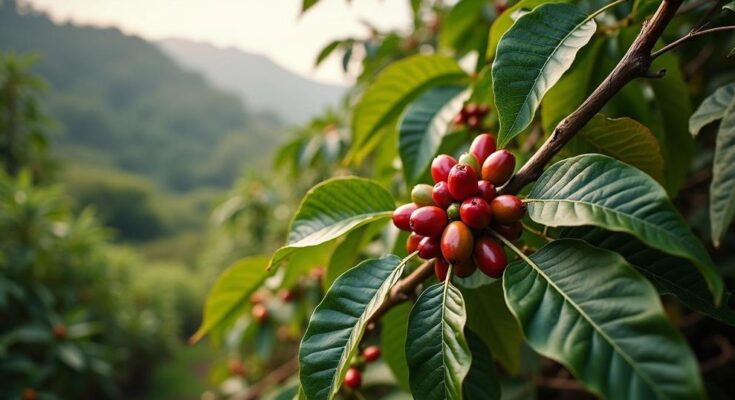Vietnam is experiencing a severe drought that threatens robusta coffee production, leading to potential crop shortfalls and higher prices. This situation, following two years of lower yields, is driving robusta futures to near-record highs and highlights broader implications of climate change on global agriculture, potentially causing inflation and increased volatility in commodity prices.
The current drought in Vietnam is significantly affecting its robusta coffee bean production, resulting in a potential crop shortfall that could elevate prices for consumers. As the second-largest coffee producer globally and the leading grower of robusta beans, Vietnam’s production challenges are consequential; experts predict a possible reduction of up to 10% in this year’s coffee crop. This alarming situation follows two consecutive years of diminished yields and has already driven robusta futures to their highest levels in nearly half a century. The situation is further exacerbated by a chilling frost in Brazil, which has reduced arabica bean production, causing prices to rise and contributing to an ongoing global coffee shortage. This predicament extends beyond the coffee market; it highlights broader implications of climate change on global agriculture. Severe climatic events, like droughts or frosts, can lead to reductions in harvests across numerous staple crops, a trend that subsequently triggers food price inflation. A study suggests that by the year 2035, the climate crisis may contribute to an increase of over one percentage point in annual global inflation. It is worth noting that central banks frequently overlook food prices in the inflation metrics they monitor, yet such oversights may need to be addressed. Should this occur, the available response options, primarily interest rate adjustments, may prove ineffective against inflation driven by agricultural yield declines. In light of these developments, it is prudent for consumers and investors to prepare for a future with fluctuating agricultural commodity prices. While climate change may amplify volatility, it may simultaneously create new investment opportunities within agricultural technology sectors aimed at improving farming efficiency and productivity, particularly in controlled indoor environments.
Vietnam’s position as a powerhouse in coffee production, specifically its dominance in robusta beans, is being threatened by environmental challenges. The ongoing drought is reported as the most severe encountered within the last decade and comes after two years marked by low production outputs. With high demand for robusta beans, the implications of a reduced yield present not only potential financial burdens for consumers who rely on coffee but also signify a larger pattern of climate-induced supply challenges that may affect various commodities worldwide. This context underscores the vital importance of resilient agricultural practices and investment in innovative technologies aimed at navigating the adversities posed by climate change.
In summary, the ongoing drought in Vietnam and adverse weather conditions in Brazil have dire implications for global coffee production, potentially causing significant increases in coffee prices. This situation illustrates the profound impact of climate change on agriculture, suggesting that consumers may face escalating costs while investors should consider opportunities in agricultural technologies. As conditions persist, it is essential for stakeholders to remain vigilant concerning food supply dynamics and emerging market trends.
Original Source: finimize.com




